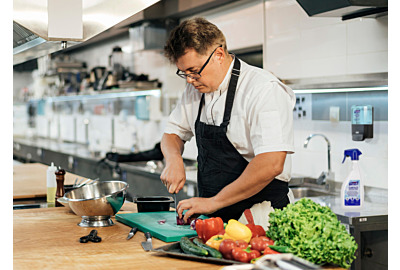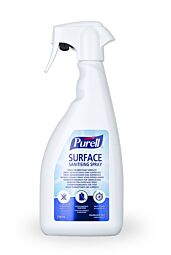Author: By Chip Manuel, Ph.D. Food Safety Science Advisor, GOJO Industries
Adapted by: Romina Peralta
As we reach peak norovirus season, I wanted to share the below takeaways from a conversation I had with two top food safety experts at the 2022 Food Safety Summit. Hal King, PhD, Managing Partner, Active Food Safety and Founder/CEO, Public Health Innovation, and Lee-Ann Jaykus, PhD, William Neal Reynolds Distinguished Professor, North Carolina State University, shared best practices to help food establishments prevent foodborne pathogens from spreading at their facilities, with a focus on norovirus.
- Exclude sick workers. Excluding sick food handlers from working, particularly those with vomiting and diarrhoea, is a requirement in the FSA “Food handlers: Fitness to work”[1] It also was a big focus during the pandemic, for the purposes of controlling the transmission of COVID-19 within the essential workforce and protecting patrons, says Dr King. "Screening employees for foodborne illness symptoms like diarrhoea and vomiting is critical in order to prevent these sick employees from spreading norovirus within a restaurant," he said.
- Focus sanitation and disinfection on key areas likely to serve as a source of cross-contamination, such as toilets and kids' play areas. Toilets, in particular, are known to be "hot spots" for norovirus contamination, as employees and guests who are experiencing symptoms may spread the virus by contaminating restroom surfaces.
- Use products that kill foodborne pathogens, like norovirus. Norovirus is one of the most common causes of foodborne illness in the UK, causing an estimated of 380,000 food poisoning cases a year[2]. This virus spreads rapidly, is difficult to inactivate, and can persist on surfaces for weeks, so it's essential to use products that are effective against it. It's worth mentioning that most food contact surface sanitisers on the market do not have a high degree of efficacy against norovirus. Be sure to examine the product's label to determine what pathogens it is effective against, and always follow the instruction for use on the labels.
- Be aware when norovirus is spreading in the community. "Norovirus is largely a community-acquired infection; about 75% of cases happen in the community," said Dr Jaykus. "So, if you have community transmission in your area, you're highly likely to be exposed to norovirus," she added. Knowing when norovirus is spreading in your area allows you to know when to keep your defences up, like practising good and frequent hand hygiene.
They shared that while many of these practices were emphasised during the COVID-19 pandemic, it's essential that food establishments remember that while COVID may wane, many of these precautions also help control foodborne pathogens (plus other respiratory viruses, like the flu). The pandemic may be winding down, but these controls remain important to protecting the safety of our food supply.
Foodborne illness outbreaks are costly, put the health of your customers and employees at risk, can significantly damage a retail foodservice establishment's reputation, and with labour shortages, operators can't afford to have employees out sick.
Watch the video to hear my full conversation with them.
[1] Food Standards Agency. (2009). Food Handlers: Fitness to Work.
[2] FSA research suggests new higher estimates for the role of food in UK illness | Food Standards Agency. (2022, June 1).
https://www.food.gov.uk/news-alerts/news/fsa-research-suggests-new-higher-estimates-for-the-role-of-food-in-uk-illness


